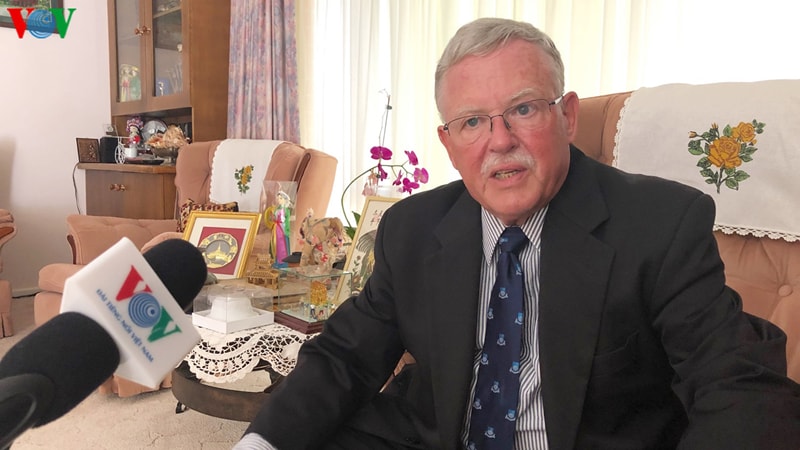Australian professor specializing in Vietnam studies: 'President Ho Chi Minh's will is a legacy'
50 years have passed but until now, Uncle Ho's Testament still retains its current value.
Professor Carl Thayer is a Vietnam expert at the University of New South Wales, Australia. He has visited Vietnam many times and studied Vietnamese. In his research on Vietnam, he also spends a lot of time studying President Ho Chi Minh's Testament, a document that he believes still has contemporary value and is a legacy for the Vietnamese people.
|
| Professor Carl Thayer, Vietnam studies expert at the University of New South Wales, Australia. |
Professor Carl Thayer affirmed that President Ho Chi Minh was a visionary, "right from the time he wrote his Testament, when the resistance war against the US was raging fiercely, he saw the end of the war with victory belonging to Vietnam" and "the North and South would be unified". Six years later, this prediction came true, but unfortunately, by then, President Ho Chi Minh had passed away and could not witness this achievement of the Vietnamese revolution.
One of the factors that contributed to the victory of the Vietnamese revolution was the connection and solidarity with the international communist movement. Professor Carl Thayer said that President Ho Chi Minh “left Vietnam to go to Western countries to seek support from Western countries, from the colonial regime and from progressive anti-colonial forces”. Professor Carl Thayer commented that President Ho Chi Minh was “an outstanding individual who combined valuable international experience to promote the Vietnamese revolution”.
To this day, Vietnam is still successfully applying this principle by continuing to “send many people abroad to learn experience and then return to build the country”. Vietnam also responds skillfully by “not letting current issues push it into a difficult situation while ensuring it is not excluded”. Professor Carl Thayer said, “Vietnam knows how to use the power of international developments to serve its own interests while remaining vigilant against issues that could negatively affect Vietnam”.
Not only solidarity and building good relationships with international friends, in his Testament, President Ho Chi Minh also emphasized the importance of building and strengthening internal solidarity. Professor Carl Thayer said that President Ho Chi Minh's "advice" on internal solidarity still holds its value in the context of Vietnam continuing its struggle to protect sovereignty and independence. In addition, Professor Carl Thayer also commented that the Communist Party of Vietnam "wants to maintain its position, it must be determined in the fight against corruption and against the degradation of cadres". In the context of Vietnam preparing for the 13th Party Congress, Professor Carl Thayer said that these issues have become even more urgent.
In the work of party rectification, Professor Carl Thayer said that President Ho Chi Minh “with his frugal lifestyle, not extravagant, not corrupt should be taken as an example” for future generations. Professor Carl Thayer commented that the occasion of the 50th anniversary of the implementation of President Ho Chi Minh’s Testament is also a time for the Vietnamese people to “look back and draw lessons for the future”. Professor Carl Thayer affirmed that the “lifestyle” and “way” in which President Ho Chi Minh “called for solidarity within the country, the approach to workers, farmers and other classes in society should be used to inspire the Vietnamese people”./.

